School bus greenhouse conversions represent an innovative and sustainable approach to year-round gardening that transforms retired vehicles into productive growing spaces. These mobile or stationary structures offer gardeners the opportunity to extend growing seasons, protect crops from harsh weather, and create controlled environments for optimal plant growth. By repurposing old school buses, gardeners can access affordable greenhouse solutions that provide excellent insulation, ample space, and unique design possibilities. From simple roof removal projects to complex aquaponic systems, school bus greenhouses accommodate various gardening styles and budgets. The following designs showcase diverse approaches to creating functional, efficient, and visually appealing growing environments using these versatile vehicles.
1. Mobile School Bus Greenhouse with Intact Drivetrain

A mobile school bus greenhouse maintains the original drivetrain, allowing gardeners to relocate their growing operation seasonally. This design features skylights cut into the roof while preserving structural integrity, with removable growing benches secured during transport. The mobile nature enables following optimal sun conditions, attending farmers markets, or avoiding severe weather. Interior modifications include lightweight aluminum growing benches, portable water storage systems, and flexible ventilation openings. Temperature control relies on opening windows and skylights rather than permanent heating systems. The floor remains original with drainage modifications for watering runoff. This versatile design appeals to market gardeners, educational programs, and seasonal growers who need flexibility in their greenhouse location throughout the year.
2. Stationary School Bus Greenhouse with Complete Roof Removal

Complete roof removal creates maximum light penetration and vertical growing space in a stationary school bus greenhouse. The entire metal roof gets replaced with polycarbonate panels or greenhouse plastic, supported by custom aluminum framing. This design maximizes natural light while maintaining wind protection from the bus sides. Original windows provide adjustable ventilation, while the floor accommodates in-ground growing beds or raised container systems. Structural reinforcement ensures the modified frame withstands weather loads without the original roof support. Installation requires cutting tools, welding equipment, and construction skills. The result offers greenhouse-quality growing conditions with superior light transmission. Heating systems integrate easily into the enclosed space, while the high ceiling accommodates tall crops like tomatoes, cucumbers, and climbing beans.
3. School Bus Greenhouse with Partial Skylight System

Partial skylight installation balances natural light with structural integrity by replacing select roof sections with transparent materials. Three to four skylights positioned between roof ribs provide excellent illumination while maintaining most of the original metal roof for weather protection. This approach reduces construction complexity and preserves the bus's structural strength. Polycarbonate or tempered glass skylights offer durability and excellent light transmission. The remaining roof sections support hanging baskets, irrigation lines, and ventilation equipment. Original windows supplement natural ventilation, while the partially covered design provides better temperature control than complete roof removal. Installation costs remain moderate while delivering significant growing improvements. This design suits gardeners seeking enhanced light conditions without extensive modifications or those in areas with severe weather requiring extra structural protection.
4. Hydroponic School Bus Greenhouse with NFT Systems

Nutrient Film Technique systems transform school bus interiors into soil-free growing environments with precise nutrient control. Custom-built growing channels run along both sides of the bus interior, utilizing the natural aisle for maintenance access. Water pumps circulate nutrient solutions through PVC channels, providing constant root zone nutrition. Reservoir tanks positioned under seating areas maximize space efficiency while maintaining system capacity. LED grow lights supplement natural light through skylights or window modifications. The enclosed environment allows year-round production regardless of weather conditions. Timer-controlled systems automate feeding schedules, while monitoring equipment tracks pH and nutrient levels. This high-tech approach produces maximum yields in minimal space, making it ideal for commercial microgreen production, herb cultivation, or educational demonstrations of modern growing techniques.
5. Aquaponic School Bus Greenhouse with Fish Tank Integration
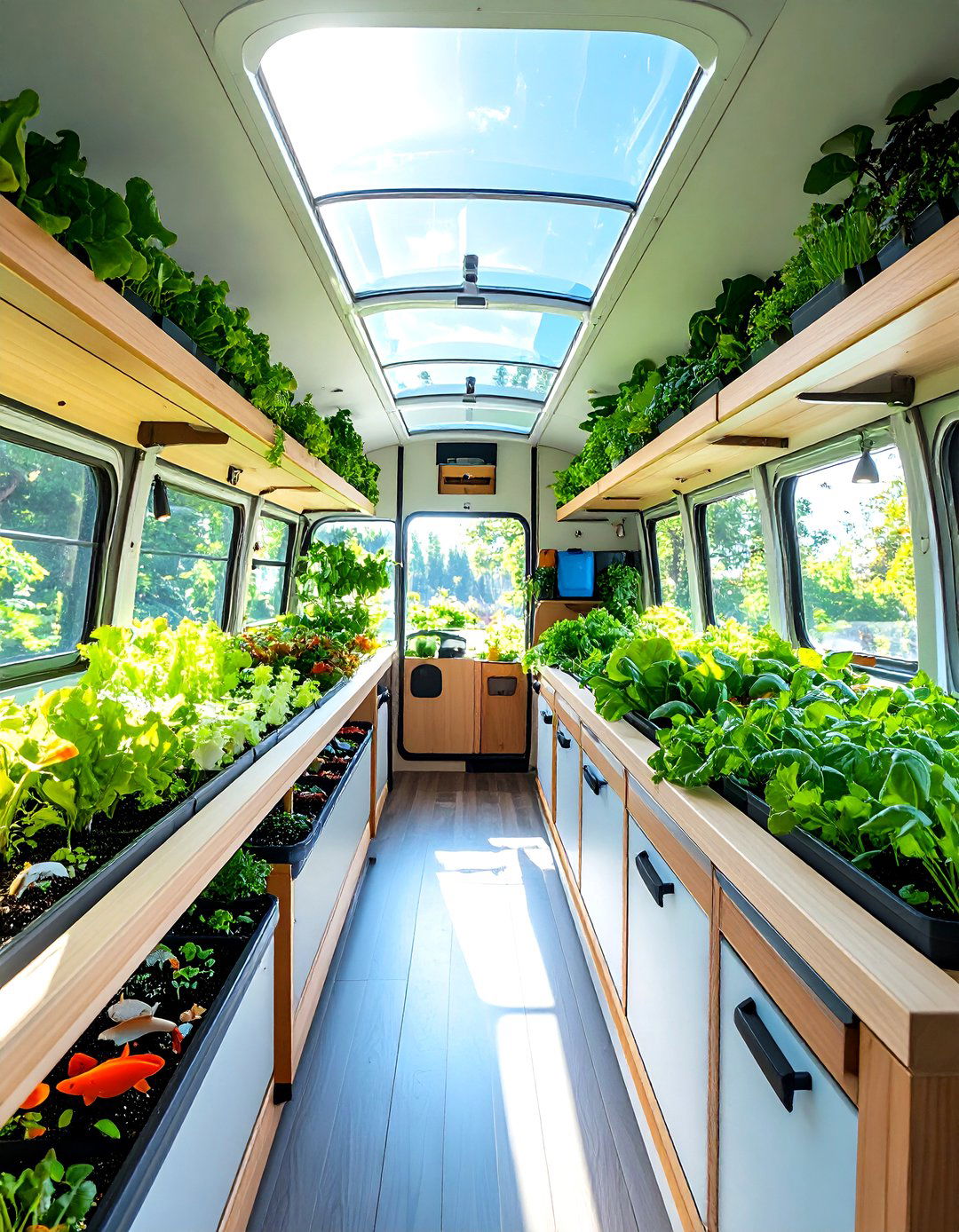
Aquaponic systems combine fish cultivation with plant production in a symbiotic school bus environment. Large fish tanks occupy the rear section while growing beds line the remaining interior space. Fish waste provides natural fertilization for plants, which filter water for fish health. The enclosed bus environment maintains stable temperatures beneficial for both fish and plants. Custom plumbing circulates water between fish tanks and growing beds using energy-efficient pumps. Skylights provide natural lighting while maintaining climate control for optimal aquatic conditions. Species selection focuses on hardy fish like tilapia paired with leafy greens and herbs. This integrated system produces both protein and vegetables while demonstrating sustainable growing principles. Educational value makes it popular for schools and community centers, while homesteaders appreciate the dual production capabilities and reduced external inputs.
6. School Bus Greenhouse with Raised Bed Growing Systems
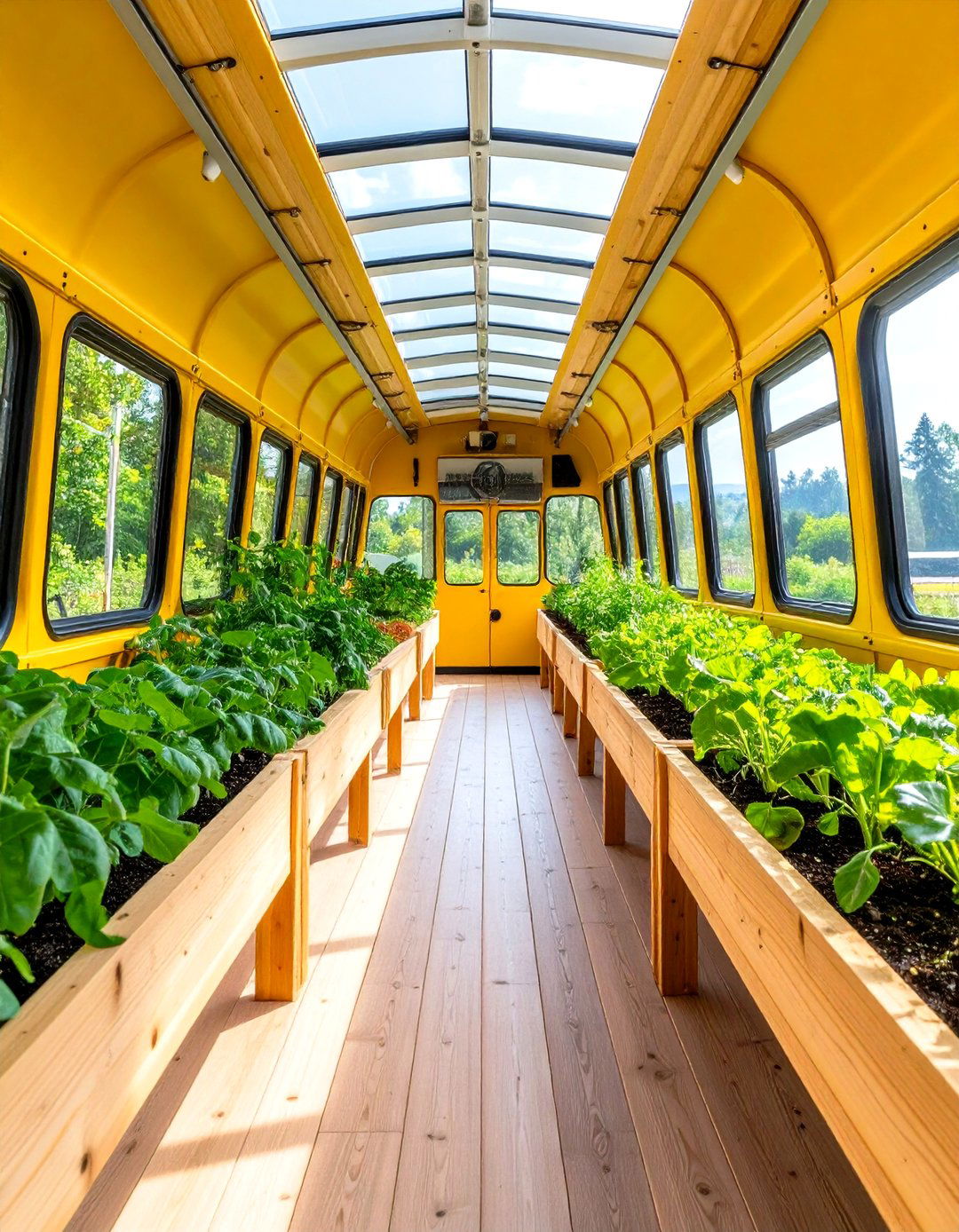
Raised growing beds maximize planting space while providing excellent growing conditions in converted school buses. Custom-built beds elevate growing medium to comfortable working heights, reducing back strain during maintenance. Multiple bed configurations accommodate different crop types and growing methods within the bus interior. Proper drainage systems prevent water damage while maintaining optimal soil moisture. The raised design improves root zone drainage and allows precise soil mixture control for different plants. Walkways between beds provide easy access for planting, maintenance, and harvesting activities. Integrated irrigation systems deliver water efficiently to each growing zone. Storage areas under beds house tools, supplies, and seasonal equipment. This traditional growing approach appeals to gardeners preferring soil-based cultivation while maximizing the bus's interior space for productive use and comfortable operation.
7. School Bus Greenhouse with Automated Climate Control
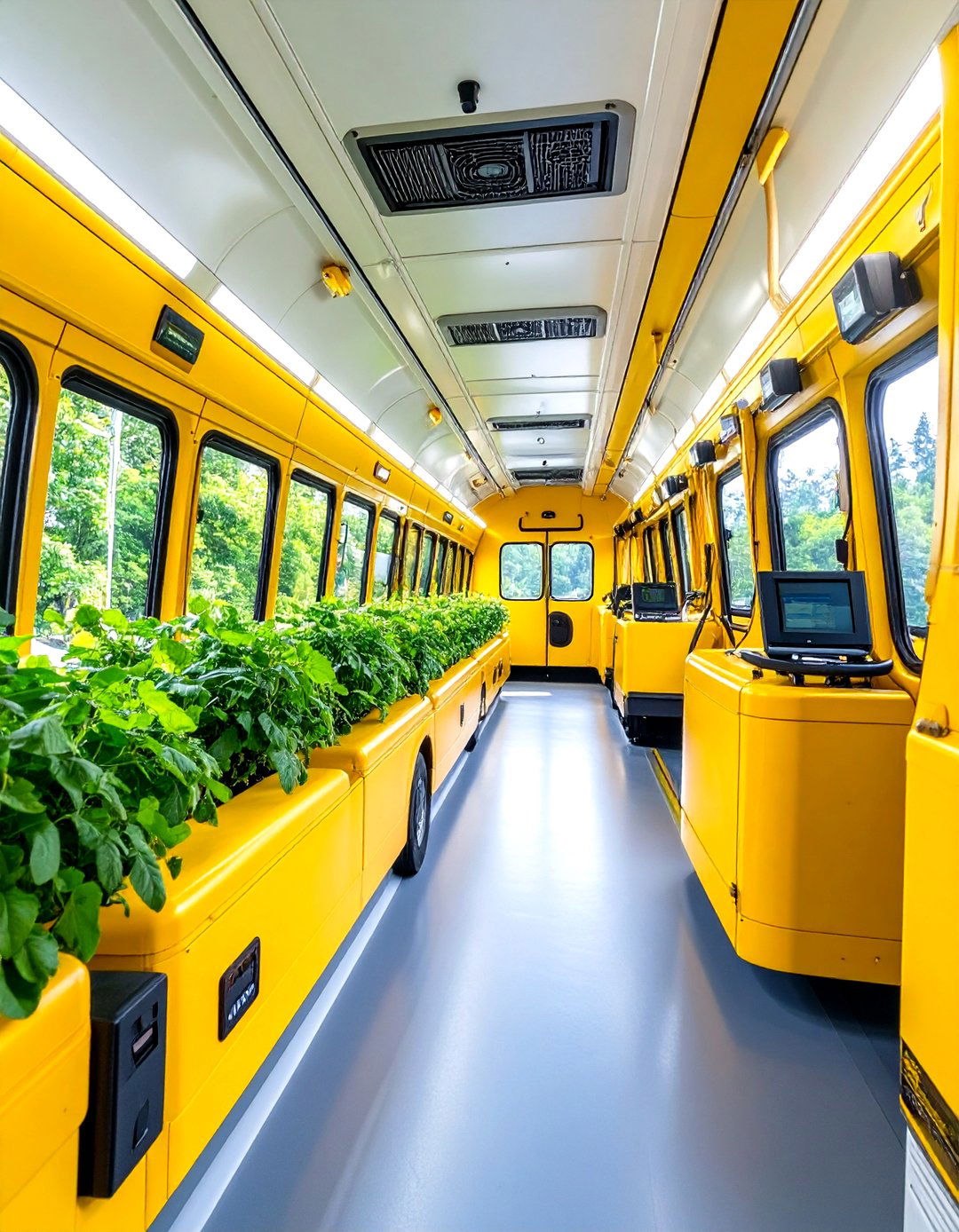
Advanced automation systems maintain optimal growing conditions automatically in converted school bus greenhouses. Sensor networks monitor temperature, humidity, light levels, and soil moisture throughout the interior space. Computer-controlled systems operate ventilation fans, heating elements, irrigation pumps, and lighting systems based on programmed parameters. Remote monitoring capabilities allow growers to check conditions and adjust settings from anywhere. Backup power systems ensure continuous operation during outages. Data logging tracks environmental conditions and plant performance over time. Integration with weather stations adjusts settings based on external conditions. This high-tech approach maximizes yields while minimizing labor requirements. Commercial growers benefit from consistent production schedules, while hobby gardeners appreciate the convenience of automated care. The system's sophistication makes it suitable for research applications and educational demonstrations of modern agricultural technology.
8. School Bus Greenhouse with Solar Power Integration
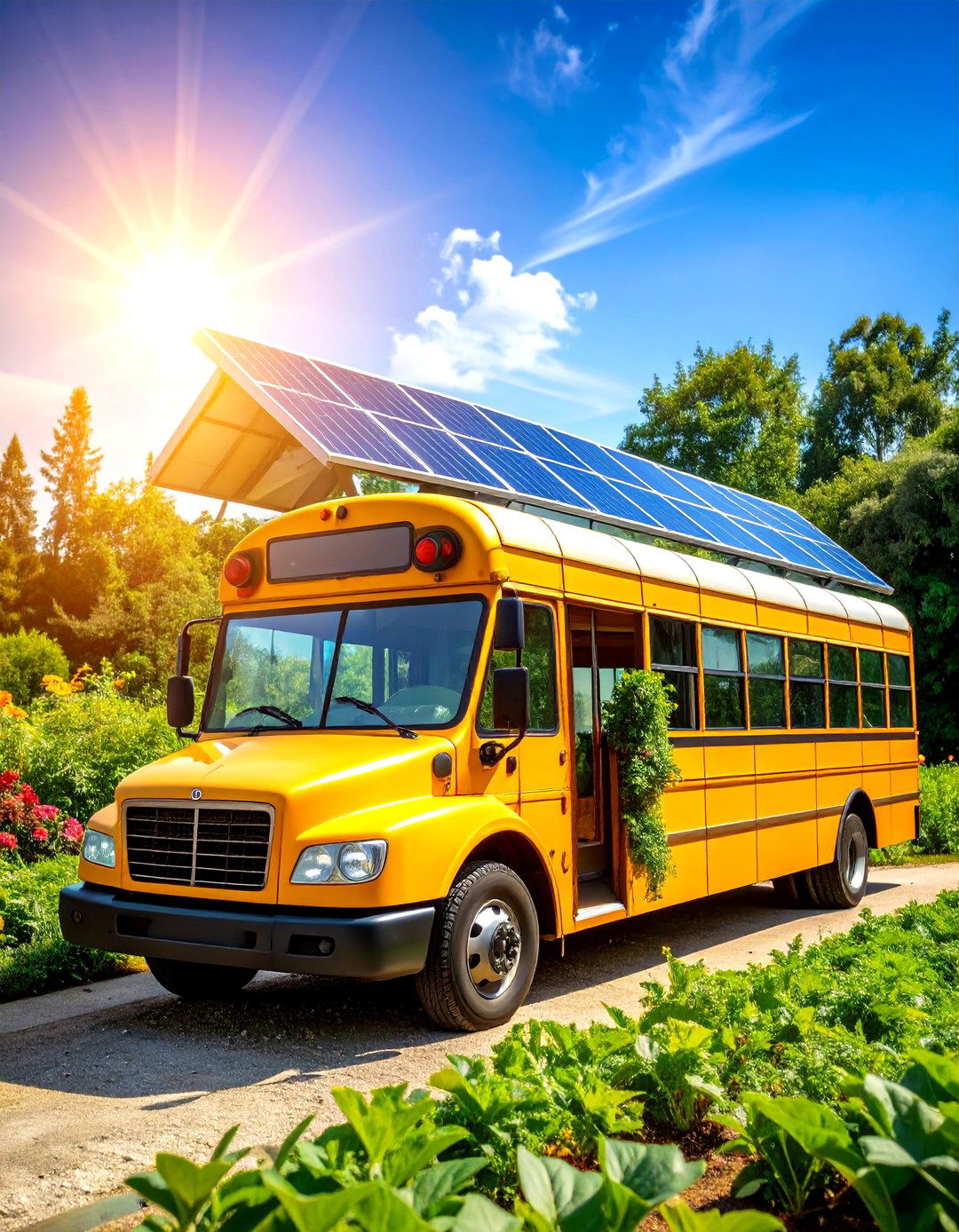
Solar panel arrays provide renewable energy for all electrical systems in off-grid school bus greenhouses. Roof-mounted panels generate power for ventilation fans, irrigation pumps, LED grow lights, and monitoring equipment. Battery storage systems ensure continuous operation during cloudy weather and nighttime hours. Energy-efficient design minimizes power consumption while maintaining optimal growing conditions. Solar-powered ventilation provides consistent air circulation without grid dependence. LED lighting systems extend daylight hours for improved plant growth using stored solar energy. Charge controllers and inverters manage power distribution efficiently throughout the system. This sustainable approach appeals to environmentally conscious growers and remote locations without electrical access. Cost savings accumulate over time while reducing environmental impact. The self-sufficient design enables greenhouse operation anywhere with adequate sunlight, making it perfect for rural properties, educational institutions, and demonstration projects focused on renewable energy applications.
9. School Bus Greenhouse with Vertical Growing Systems
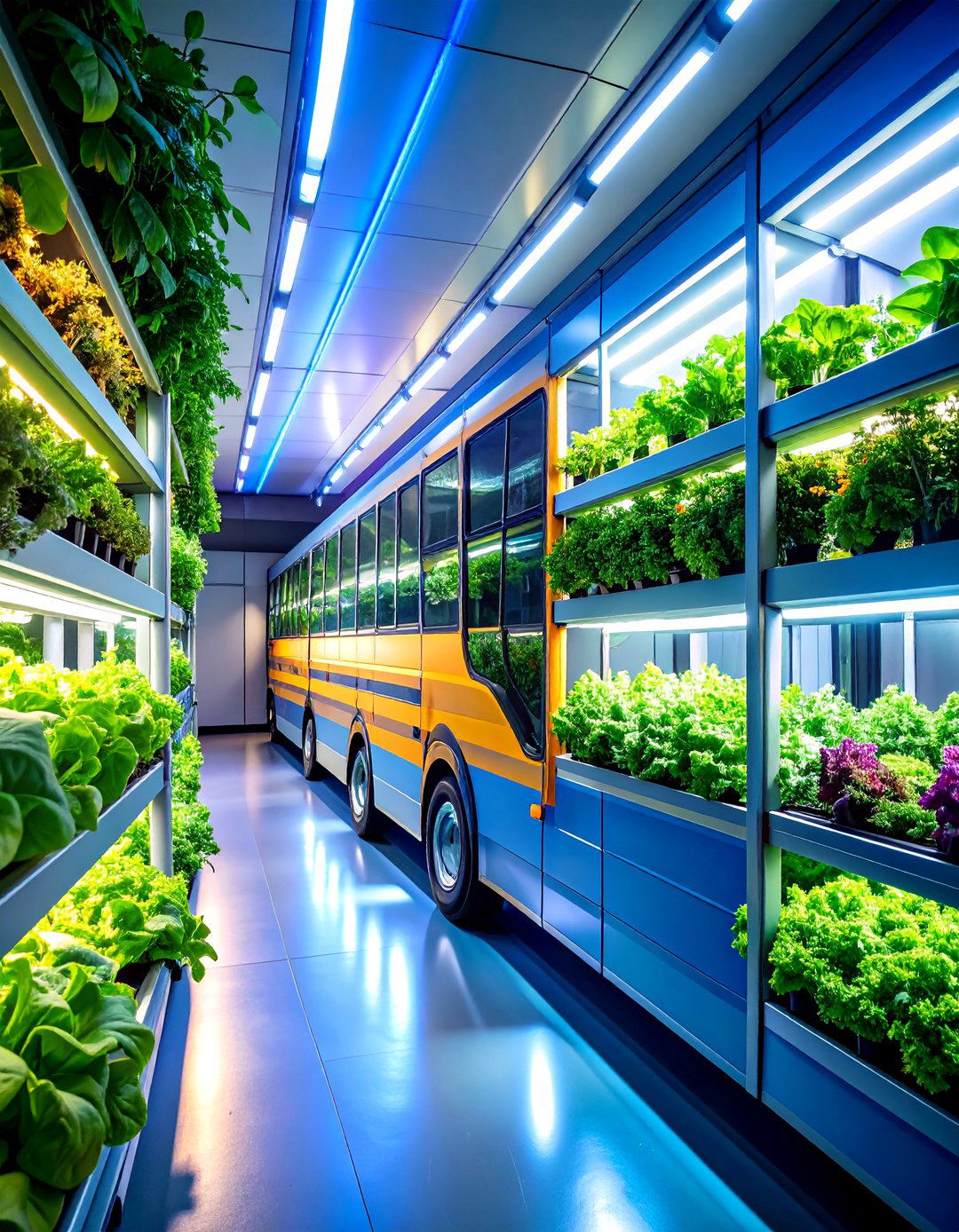
Vertical growing systems maximize production capacity by utilizing the full height potential of school bus interiors. Multi-tiered growing racks support multiple growing levels with LED lighting supplementing each tier. Hydroponic or aeroponic systems deliver nutrients efficiently to plants at all levels. Vertical configurations triple or quadruple growing space compared to traditional horizontal layouts. Automated watering systems service each level independently with precise nutrient delivery. Climbing plants utilize vertical support structures reaching to the modified ceiling area. Specialized crops like strawberries thrive in vertical tower systems positioned throughout the interior. Maintenance platforms provide safe access to upper growing levels. This intensive approach maximizes yields per square foot while demonstrating space-efficient growing techniques. Urban farmers, commercial producers, and educational facilities benefit from the increased production capacity and innovative growing methods showcased in vertical systems.
10. School Bus Greenhouse with Seasonal Crop Rotation
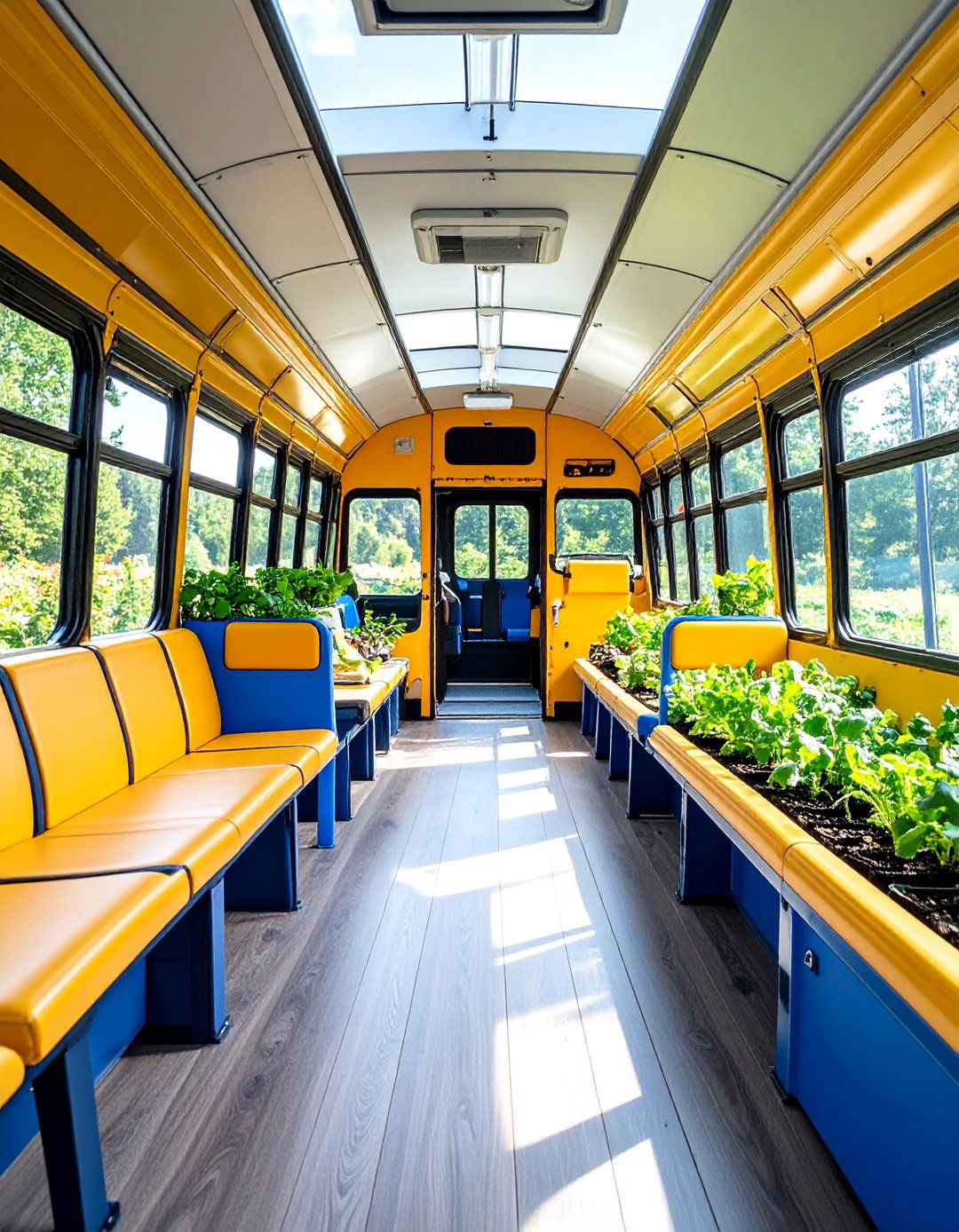
Seasonal crop rotation maximizes production diversity throughout the year in converted school bus greenhouses. Removable growing systems accommodate different crops based on seasonal demands and optimal growing conditions. Spring configurations emphasize seedling production with heated propagation areas and adjustable ventilation. Summer setups focus on heat-loving crops with maximum ventilation and shading systems. Fall arrangements accommodate cool-season vegetables with modified heating and lighting systems. Winter operations utilize intensive growing methods with supplemental lighting and heating systems. Modular growing benches and containers facilitate easy reconfiguration between seasons. Storage areas house seasonal equipment and supplies for quick changeovers. This adaptive approach provides year-round productivity while optimizing conditions for different crop types. Market gardeners benefit from seasonal flexibility, while educational programs demonstrate diverse growing techniques and seasonal adaptation strategies throughout the academic year.
11. School Bus Greenhouse with Composting Integration

Integrated composting systems recycle organic waste while providing natural fertilization for plants in school bus greenhouses. Composting bins positioned at one end of the bus process kitchen scraps, garden waste, and organic materials. Heat generated by decomposition supplements greenhouse heating during cooler months. Finished compost enriches growing medium throughout the interior growing systems. Proper ventilation manages composting odors while maintaining air quality for plants. Three-bin systems provide continuous compost production with materials at different decomposition stages. Worm composting bins process organic waste efficiently in smaller spaces. Temperature monitoring ensures optimal composting conditions and safety. This sustainable approach reduces external inputs while demonstrating circular growing principles. Homesteaders appreciate the waste reduction and fertilizer production, while educational programs showcase sustainable growing practices and natural nutrient cycling within closed-loop systems.
12. School Bus Greenhouse with Rainwater Harvesting
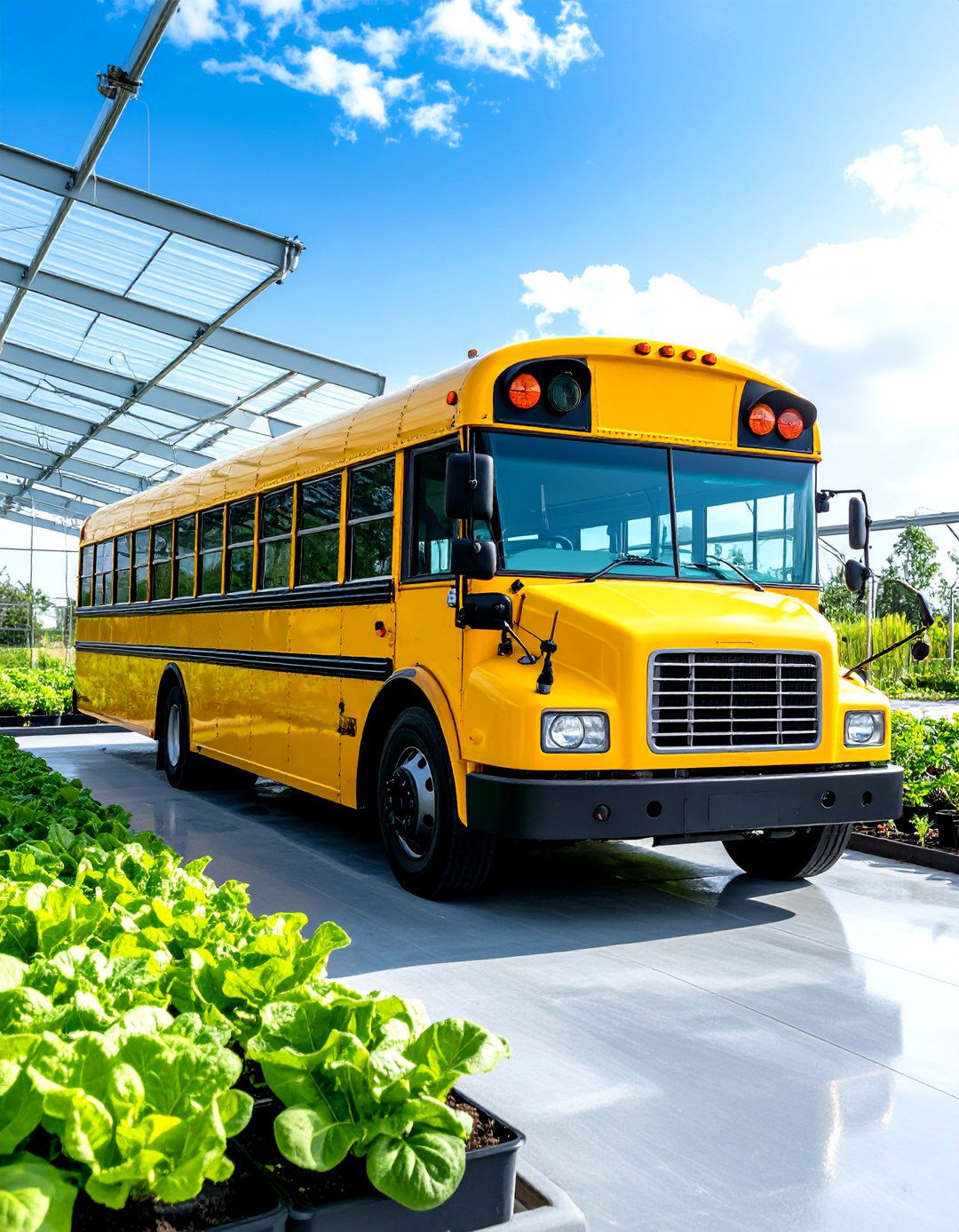
Rainwater collection systems provide sustainable irrigation for school bus greenhouse operations using natural precipitation. Gutters and downspouts channel roof runoff into storage tanks positioned around the greenhouse perimeter. Filtration systems remove debris and contaminants from collected water before storage. Gravity-fed distribution systems eliminate pumping requirements while maintaining consistent water pressure. Storage capacity calculations ensure adequate water supply during dry periods. Overflow systems manage excess water during heavy rainfall events. Water quality testing ensures suitability for plant irrigation and food crop production. Distribution networks deliver collected water efficiently throughout the growing areas. This water-independent approach reduces operating costs while demonstrating sustainable resource management. Rural locations benefit from reliable water sources, while urban installations reduce municipal water consumption and demonstrate environmental stewardship principles to communities.
13. School Bus Greenhouse with Medicinal Herb Production
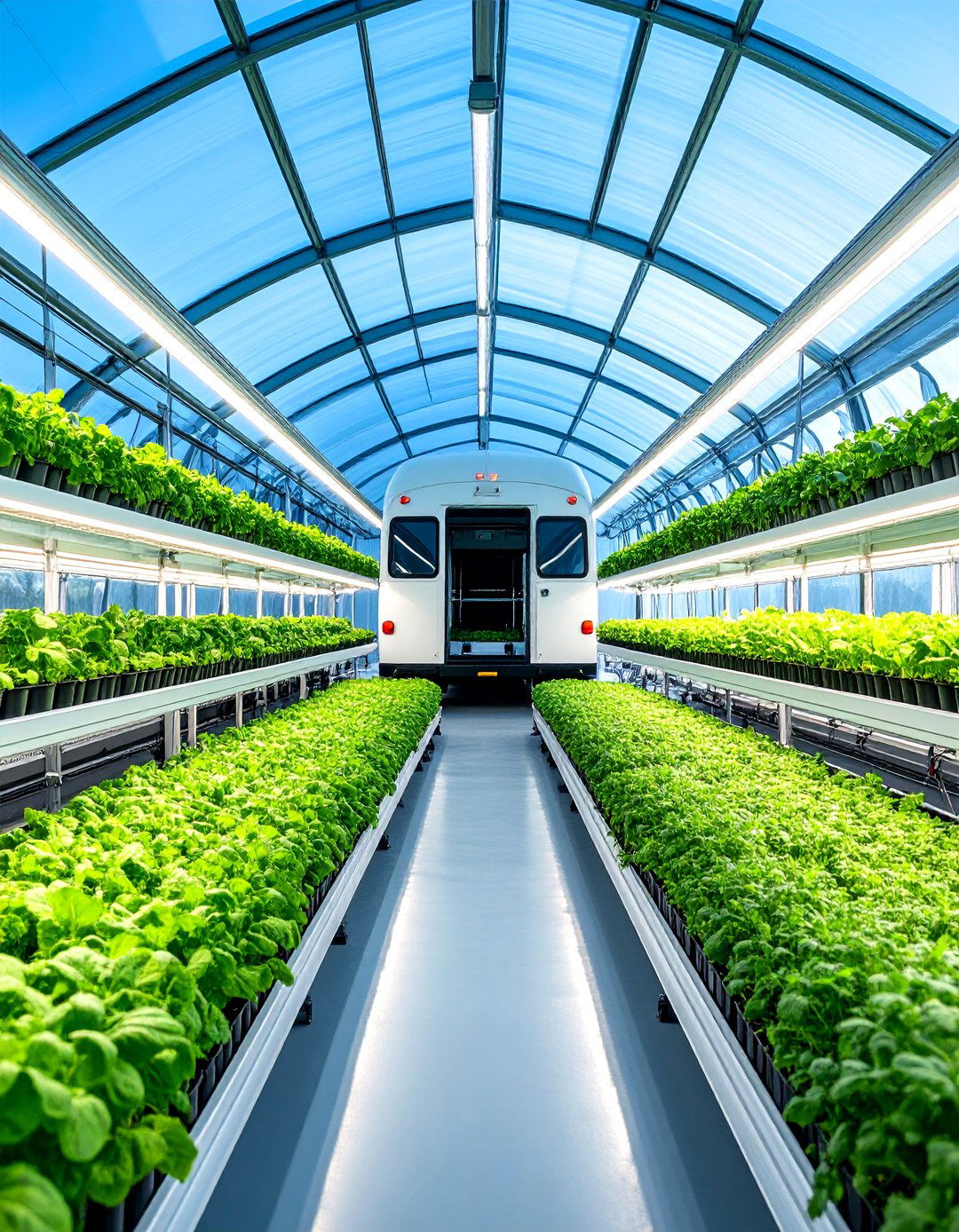
Specialized herb production focuses on medicinal and culinary plants in controlled school bus greenhouse environments. Climate control systems maintain optimal conditions for sensitive herb varieties requiring specific temperature and humidity ranges. Drying and processing areas prepare harvested herbs for storage and use. Organized growing zones separate different herb families based on cultural requirements and harvesting schedules. Essential oil production equipment processes aromatic herbs for value-added products. Temperature and humidity controls preserve herb quality and potency throughout production. Integrated pest management prevents contamination while maintaining organic growing practices. Harvest timing systems ensure peak potency when collecting medicinal plants. Storage systems preserve dried herbs properly for long-term use. This specialized approach serves alternative medicine practitioners, culinary professionals, and educational programs. The controlled environment ensures consistent quality while extending growing seasons for temperature-sensitive varieties and enabling production of herbs typically unavailable locally.
14. School Bus Greenhouse with Seed Starting Operations

Professional seed starting operations utilize school bus greenhouses for efficient seedling production and plant propagation. Heated propagation areas maintain optimal germination temperatures for diverse seed varieties. Misting systems provide gentle moisture for delicate seedlings without disturbing soil or seeds. Adjustable lighting systems accommodate different photoperiod requirements for various plant species. Temperature zones allow simultaneous germination of seeds requiring different thermal conditions. Transplanting areas provide space for potting up seedlings as they develop. Hardening-off zones gradually acclimate plants to outdoor conditions before transplanting. Inventory systems track seed varieties, germination rates, and production schedules efficiently. This specialized approach serves market gardeners, landscapers, and nursery operations. The controlled environment ensures consistent germination rates while extending the growing season. Educational programs benefit from reliable seedling production for teaching purposes and community garden distributions.
15. School Bus Greenhouse with Mushroom Cultivation

Mushroom cultivation systems transform school bus interiors into controlled environments for fungal production. Growing chambers maintain specific temperature, humidity, and ventilation requirements for different mushroom varieties. Shelving systems maximize growing space while providing proper air circulation around mushroom beds. Substrate preparation areas process growing materials for inoculation with mushroom spawn. Sterilization equipment ensures contamination-free growing conditions essential for successful mushroom production. Climate control systems maintain precise environmental conditions for optimal mushroom development. Harvesting and processing areas handle mature mushrooms for market preparation. Specialized ventilation manages air quality while preventing contamination from external sources. This unique application demonstrates alternative growing methods while producing valuable food crops. The controlled environment enables year-round production regardless of external weather conditions. Commercial producers benefit from consistent yields, while educational programs showcase sustainable protein production and alternative agricultural methods.
16. School Bus Greenhouse with Pollinator Garden Integration
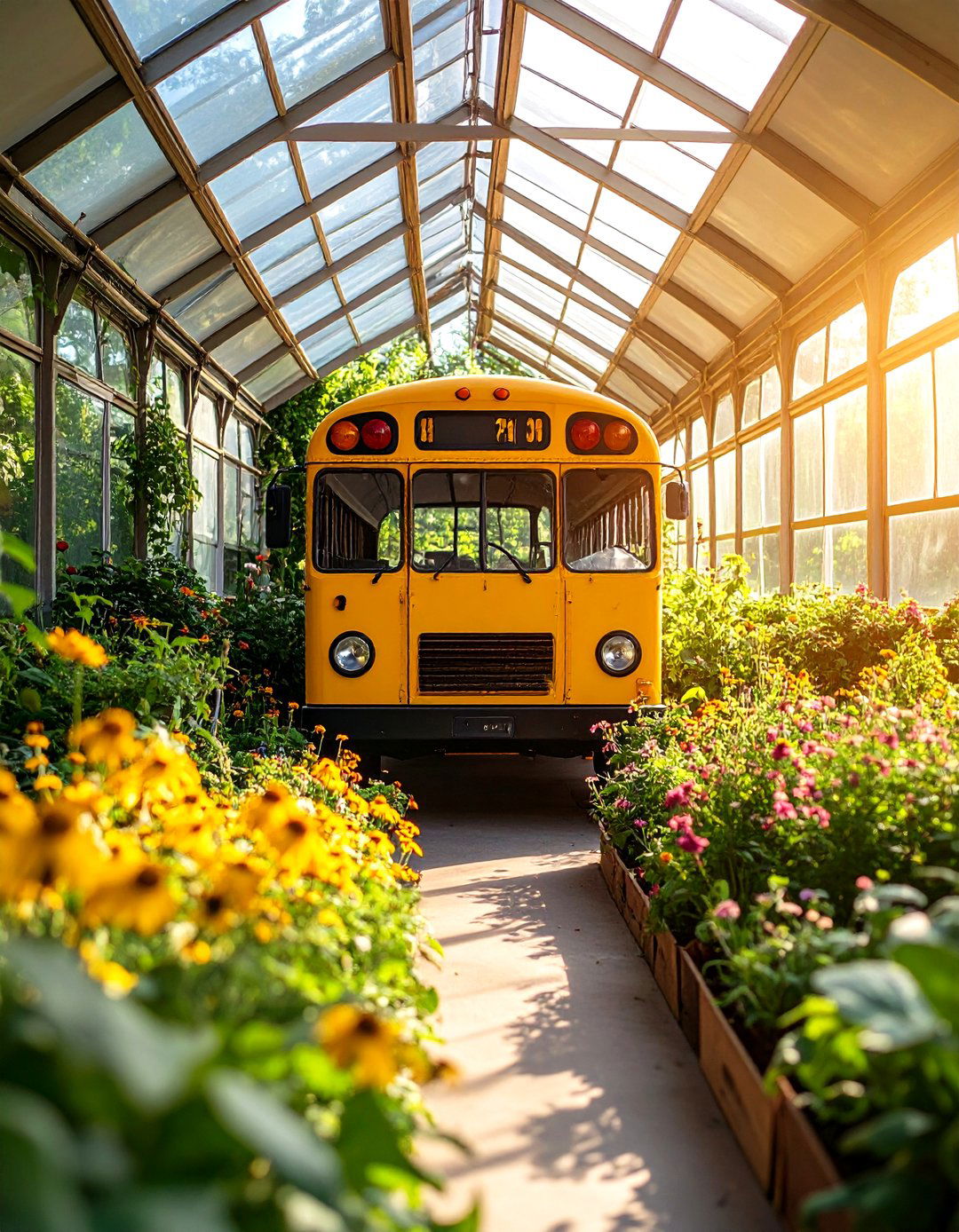
Pollinator-friendly plants integrate beneficial insects into school bus greenhouse ecosystems while supporting surrounding garden areas. Native flowering plants provide nectar sources throughout extended growing seasons. Bee-friendly herbs and flowers attract pollinators while producing useful crops for harvest. Butterfly gardens showcase native species while supporting local pollinator populations. Integrated pest management relies on beneficial insects rather than chemical treatments. Pollinator habitat areas provide nesting sites and overwintering protection within the greenhouse structure. Native plant propagation supports habitat restoration and educational programs. Seasonal flowering sequences ensure continuous pollinator support throughout growing seasons. This ecological approach demonstrates sustainable growing principles while supporting environmental health. Educational programs benefit from living examples of pollinator relationships and native plant conservation. The integration creates a complete ecosystem while producing food crops and supporting biodiversity within controlled greenhouse environments.
17. School Bus Greenhouse with Cold Frame Ventilation
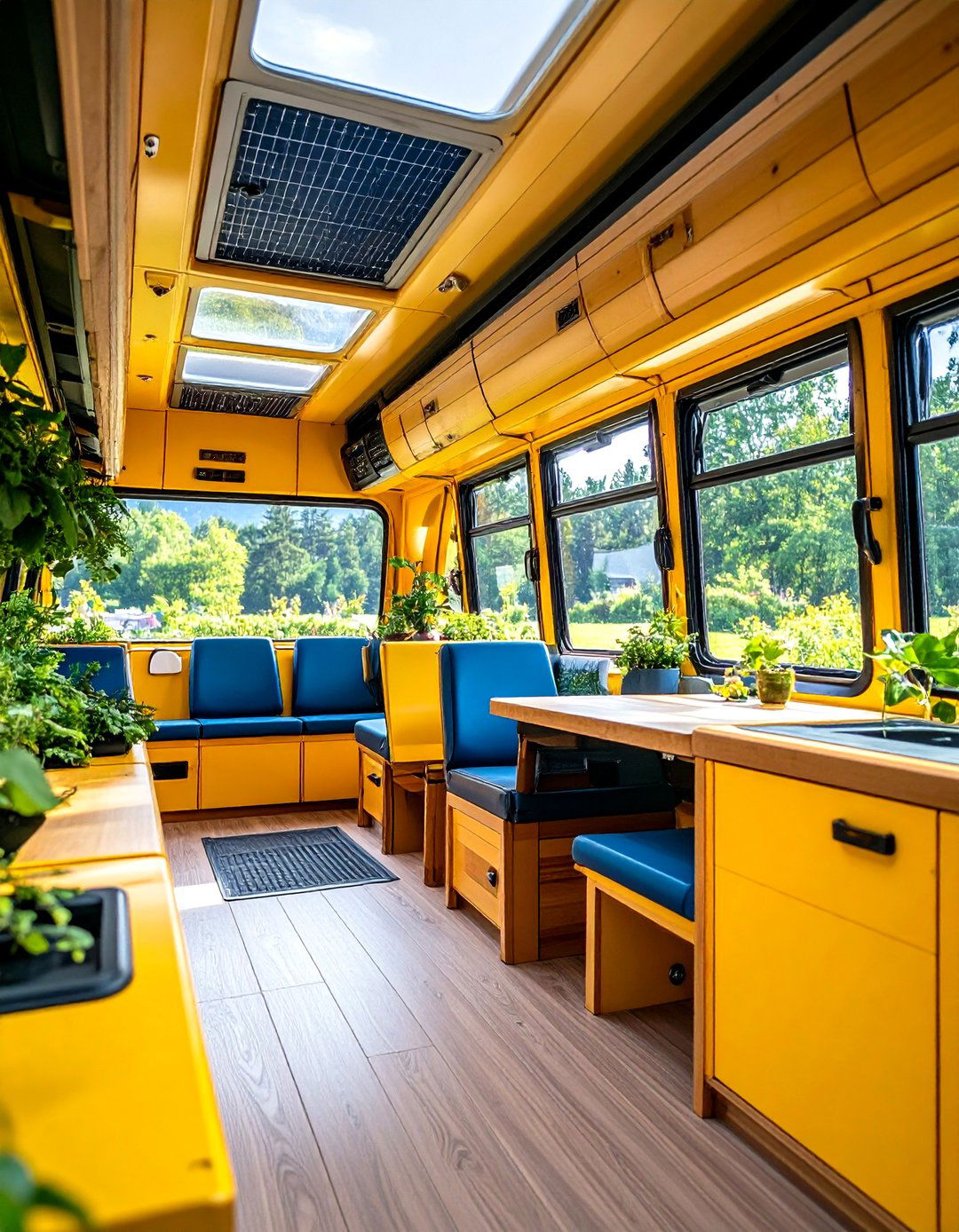
Cold frame ventilation systems regulate temperature naturally in school bus greenhouses using passive solar principles. Automatic vent openers respond to temperature changes without electrical power, opening and closing vents based on thermal expansion. Adjustable louvers provide precise ventilation control throughout the growing season. Thermal mass materials store and release heat for temperature moderation during day-night cycles. Insulated panels provide additional thermal protection during extreme weather conditions. Natural convection systems circulate air efficiently without mechanical fans or electrical power requirements. Season extension techniques enable growing operations during traditionally off-season periods. Passive solar design principles maximize natural heating while preventing overheating during sunny days. This energy-independent approach reduces operating costs while maintaining optimal growing conditions. Off-grid applications benefit from reliable temperature control without electrical requirements. Educational programs demonstrate sustainable growing techniques and natural climate control principles.
18. School Bus Greenhouse with Living Wall Systems

Living wall systems utilize vertical bus interior surfaces for maximum growing density while creating attractive growing environments. Modular growing panels attach to interior walls, supporting diverse plant varieties in compact spaces. Irrigation systems deliver water and nutrients efficiently to all growing zones throughout vertical installations. Structural modifications support additional weight loads from soil, plants, and water systems. Plant selection emphasizes varieties suitable for vertical growing conditions and interior light levels. Automated feeding systems maintain consistent nutrition for plants at different wall positions and heights. Drainage systems manage excess water while preventing damage to the bus structure and interior surfaces. This intensive growing method maximizes production while creating visually appealing interior environments. Urban applications benefit from space efficiency, while educational programs demonstrate innovative growing techniques. The living wall approach combines food production with aesthetic appeal, making it suitable for demonstration projects and commercial operations.
19. School Bus Greenhouse with Geothermal Heating

Geothermal heating systems utilize earth's constant temperature for efficient climate control in school bus greenhouses. Ground-source heat pumps provide consistent heating and cooling using minimal electrical energy. Underground piping systems transfer thermal energy between earth and greenhouse interior. Thermal mass integration stores and distributes geothermal energy efficiently throughout the growing space. Backup heating systems provide additional capacity during extreme weather conditions. Energy monitoring systems track efficiency and optimize performance throughout different seasons. Ground loop installation requires proper sizing and professional installation for optimal performance. This efficient heating method reduces operating costs while maintaining precise temperature control. The sustainable approach appeals to environmentally conscious growers while providing reliable climate control. Rural installations benefit from consistent energy sources, while educational programs demonstrate renewable energy applications and sustainable growing techniques for long-term environmental stewardship.
20. School Bus Greenhouse with Smart Irrigation Systems
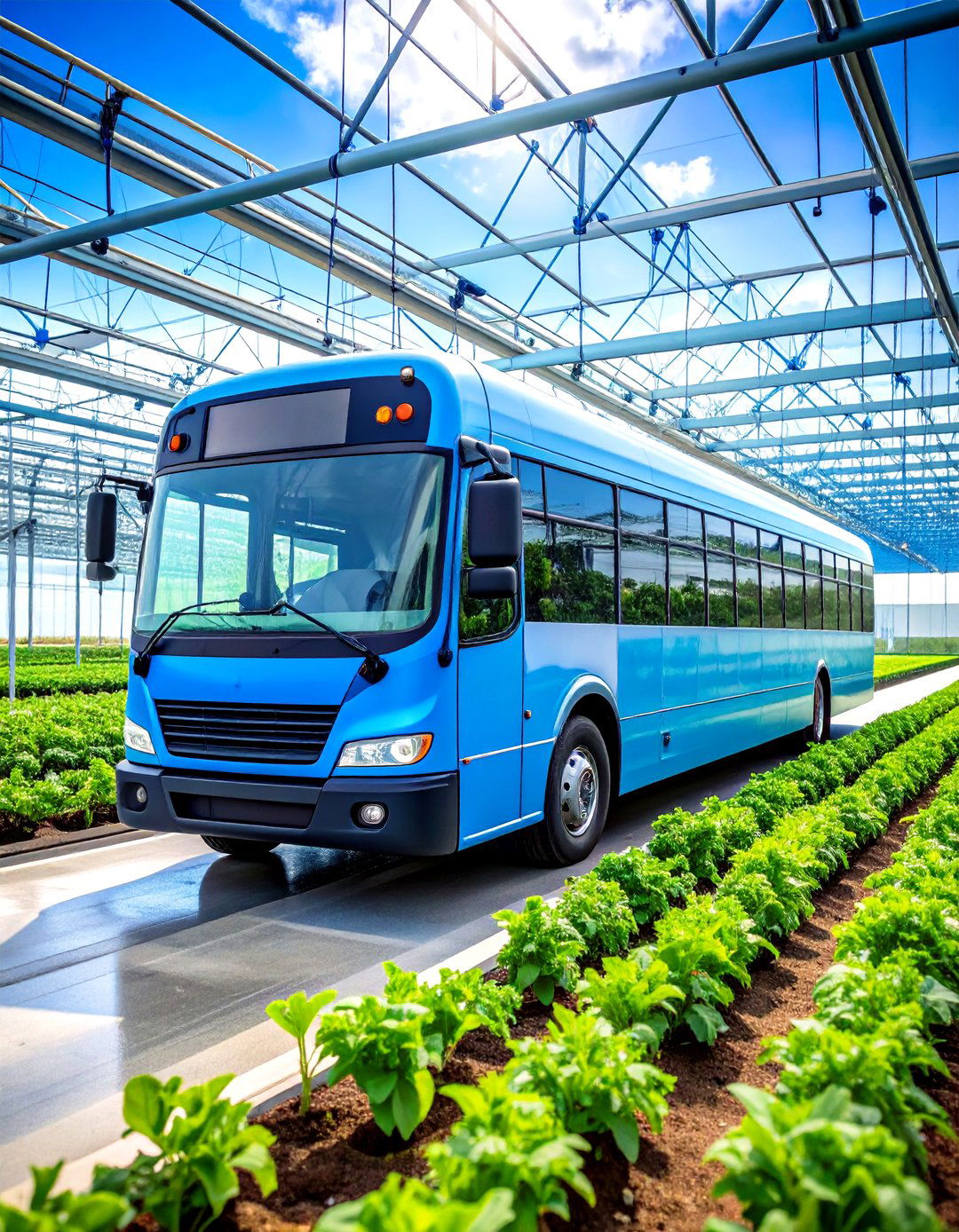
Smart irrigation technology optimizes water delivery while conserving resources in school bus greenhouse operations. Soil moisture sensors monitor growing medium conditions continuously, triggering irrigation only when plants require water. Weather station integration adjusts watering schedules based on atmospheric conditions and seasonal changes. Zone-specific controls deliver precise amounts of water to different crops based on individual requirements. Nutrient injection systems add fertilizers automatically to irrigation water for optimal plant nutrition. Leak detection systems prevent water waste while protecting greenhouse structures from damage. Remote monitoring capabilities allow growers to manage irrigation from mobile devices anywhere. Data logging tracks water usage patterns and plant response for continuous system optimization. This precision approach maximizes growing efficiency while minimizing resource consumption. Commercial operations benefit from labor savings and consistent plant care. Educational programs demonstrate modern agricultural technology and water conservation principles for sustainable growing practices.
21. School Bus Greenhouse with Aquaculture Fish Production
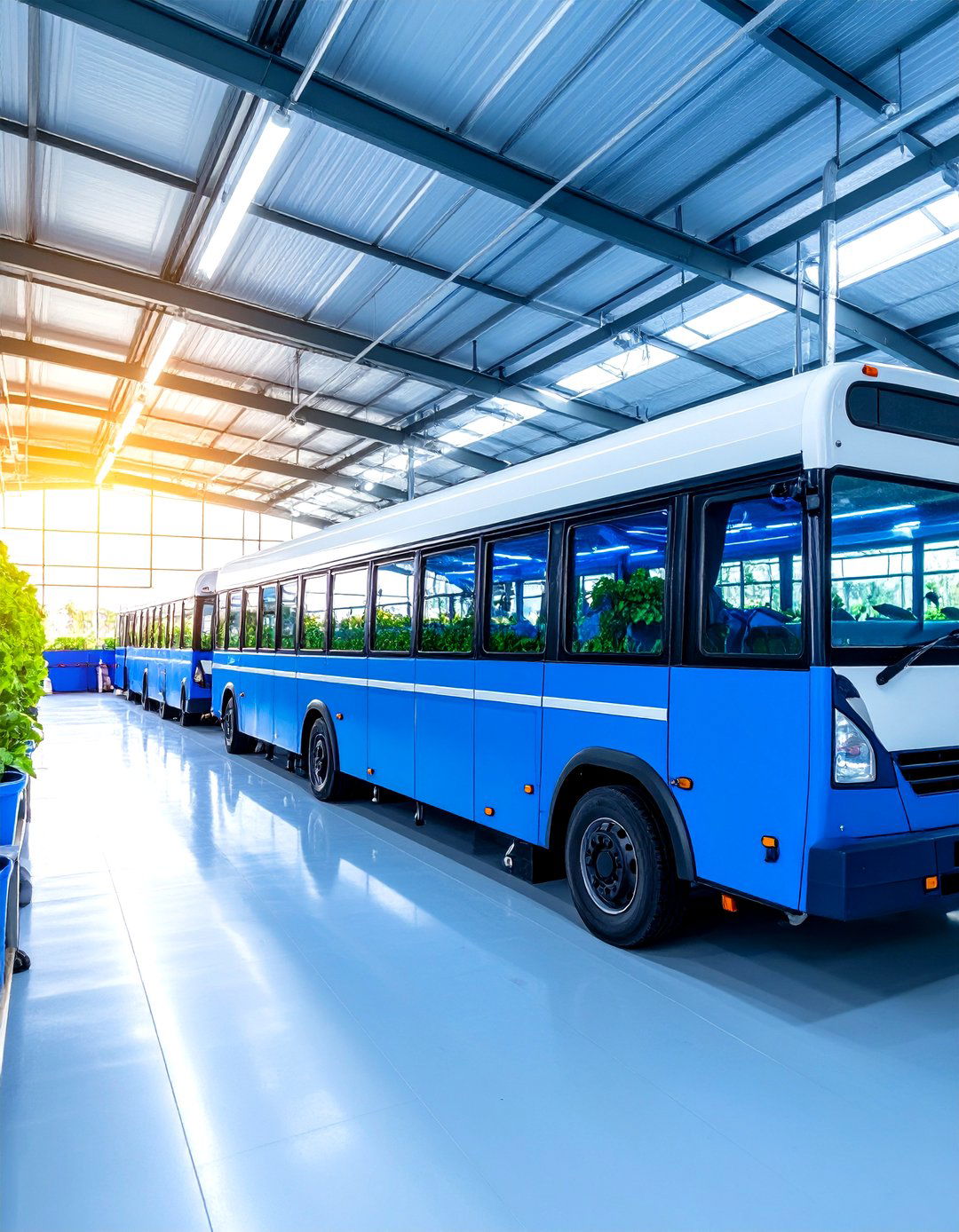
Dedicated aquaculture systems focus on fish production while utilizing school bus structures for controlled environment management. Multiple tank systems support different fish species or age groups throughout production cycles. Water filtration and recycling systems maintain optimal water quality for healthy fish development. Temperature control systems ensure proper thermal conditions for selected fish species year-round. Feeding systems deliver nutrition efficiently while minimizing waste and maintaining water quality. Harvest and processing areas handle mature fish for market preparation within the converted bus structure. Breeding programs maintain continuous production cycles for sustainable fish farming operations. Water quality monitoring ensures optimal conditions while preventing disease and mortality issues. This specialized approach provides sustainable protein production while demonstrating alternative farming methods. Educational programs benefit from living examples of aquaculture principles, while commercial operations produce valuable food products using efficient, controlled growing environments.
22. School Bus Greenhouse with Microgreen Production

Microgreen production systems maximize yields in minimal space using school bus greenhouses for controlled environment growing. Multiple growing trays support continuous production cycles with staggered planting schedules. Specialized growing medium provides optimal conditions for quick germination and rapid growth. Precise lighting systems ensure uniform growth while maximizing nutritional content in harvested microgreens. Climate control maintains ideal temperature and humidity for different microgreen varieties throughout production cycles. Harvesting equipment enables efficient collection of mature microgreens at peak quality and nutrition. Packaging areas prepare products for market distribution while maintaining freshness and quality. Storage systems preserve harvested microgreens properly for extended shelf life. This high-value crop production serves restaurants, health food stores, and direct market sales. The controlled environment ensures consistent quality while enabling year-round production regardless of external weather conditions.
23. School Bus Greenhouse with Educational Learning Stations

Educational learning stations transform school bus greenhouses into interactive classrooms for agricultural and environmental education. Different growing zones demonstrate various cultivation methods and plant science principles. Interactive displays explain plant biology, photosynthesis, and environmental relationships within living greenhouse systems. Student work areas provide hands-on learning opportunities for planting, maintenance, and harvesting activities. Data collection stations enable scientific observation and record-keeping for ongoing experiments. Seasonal curriculum integration aligns greenhouse activities with academic year schedules and learning objectives. Research projects utilize greenhouse conditions for controlled experiments and scientific methodology. Technology integration incorporates sensors, data logging, and digital tools for modern agricultural education. This educational approach serves schools, community centers, and extension programs. The hands-on learning environment engages students while demonstrating sustainable growing practices and environmental stewardship principles for future agricultural professionals.
24. School Bus Greenhouse with Community Garden Integration
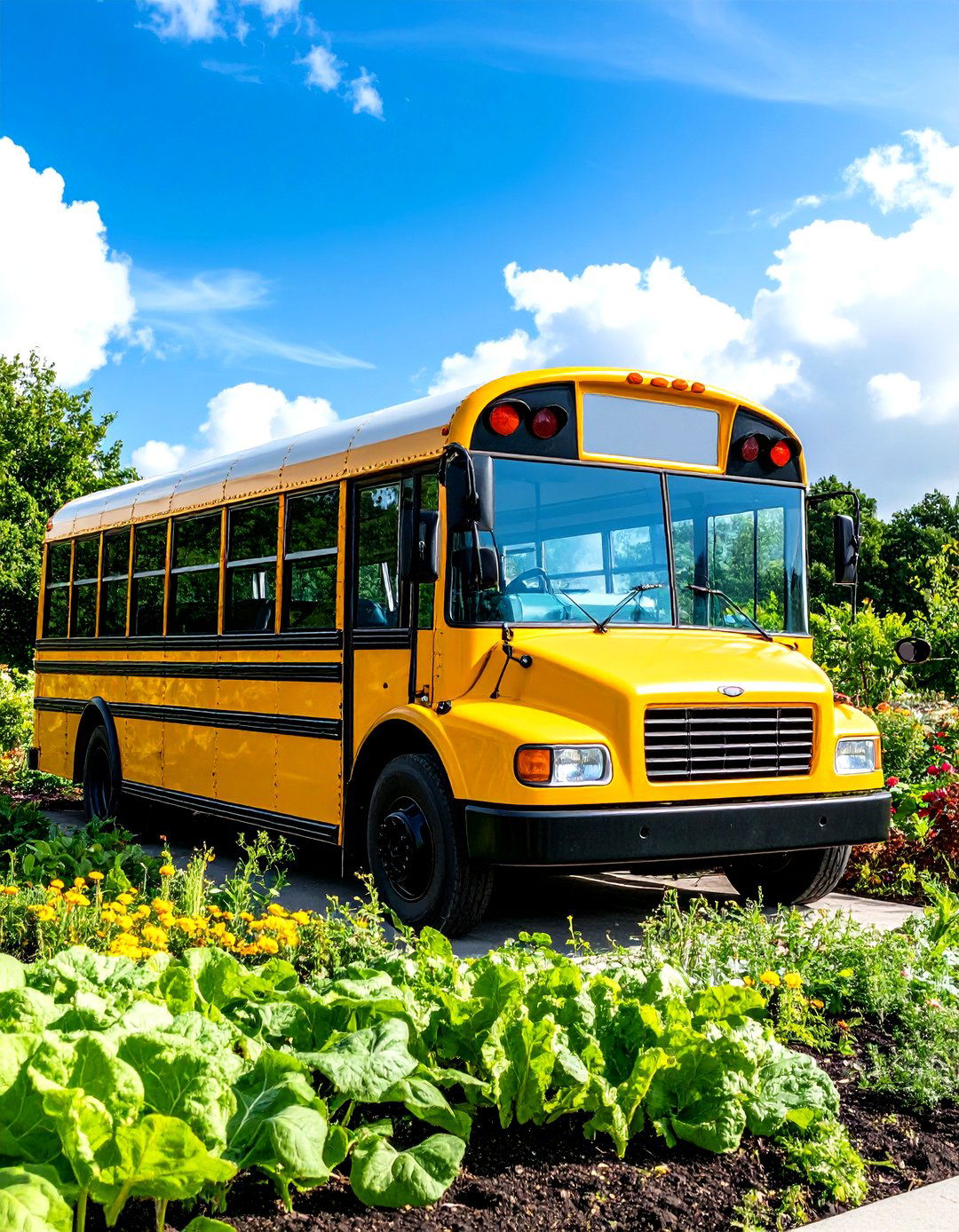
Community garden integration connects school bus greenhouses with neighborhood growing programs for expanded food production capacity. Shared resources optimize equipment usage and maintenance costs among multiple garden participants. Educational programs serve diverse community members with varying experience levels and growing interests. Tool libraries house shared equipment while reducing individual investment requirements for community participants. Seed libraries preserve heritage varieties while encouraging seed saving and community seed exchanges. Community events utilize the greenhouse space for workshops, demonstrations, and social gathering activities. Volunteer coordination systems organize maintenance, harvesting, and educational activities among community members. Cultural diversity programs celebrate different growing traditions and food cultures within community settings. This collaborative approach builds community connections while increasing local food production. The shared resource model makes greenhouse growing accessible to more people while demonstrating cooperative growing principles and community development through agricultural activities.
Conclusion:
School bus greenhouse conversions offer innovative solutions for sustainable growing operations across diverse applications and skill levels. These versatile structures accommodate everything from simple seasonal growing to sophisticated automated systems, making greenhouse growing accessible to more gardeners. The combination of affordability, mobility options, and structural durability makes school buses ideal candidates for greenhouse conversion projects. Whether serving educational purposes, commercial production, or personal food security, these converted vehicles demonstrate creative resource utilization while supporting local food systems and environmental stewardship principles.




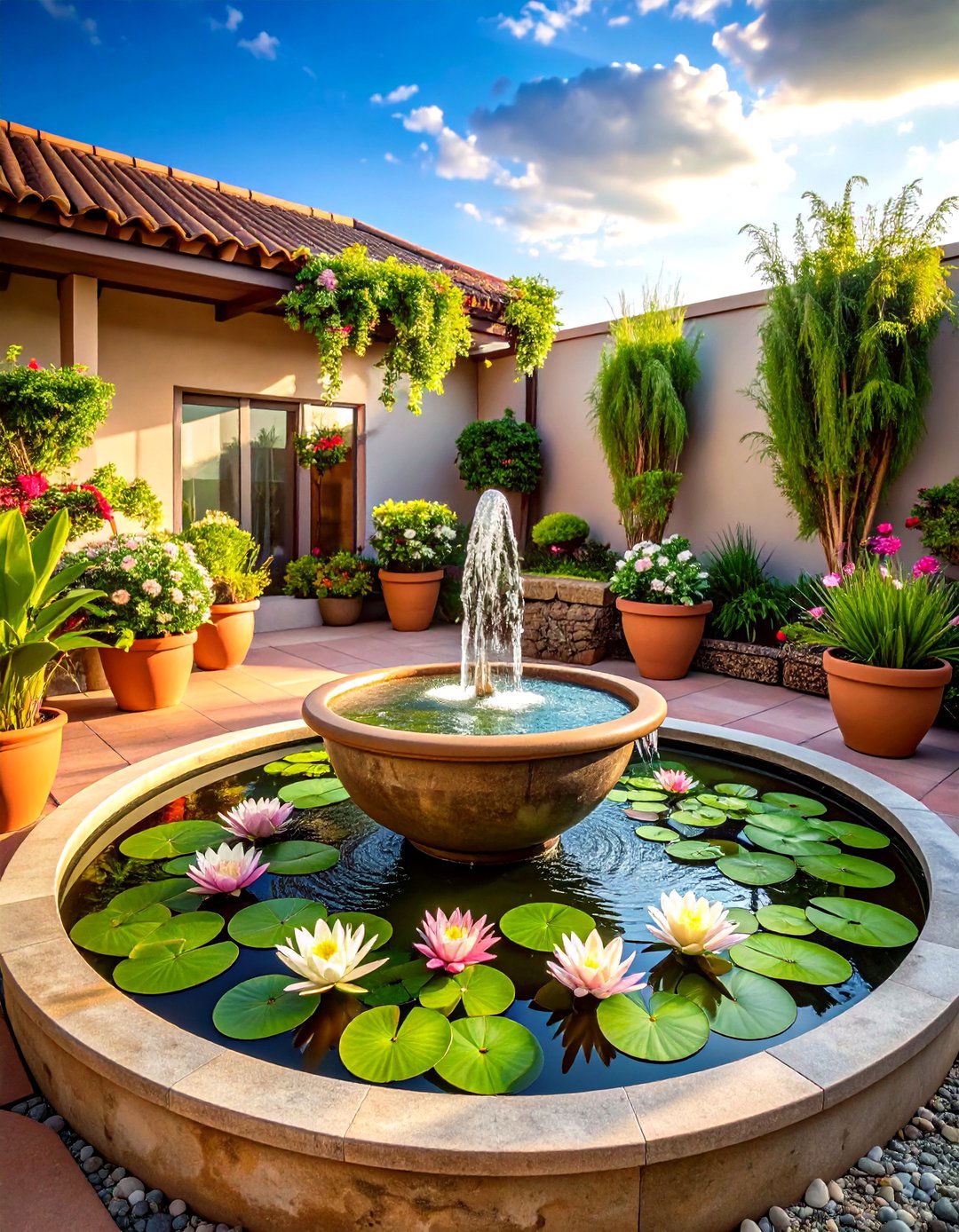
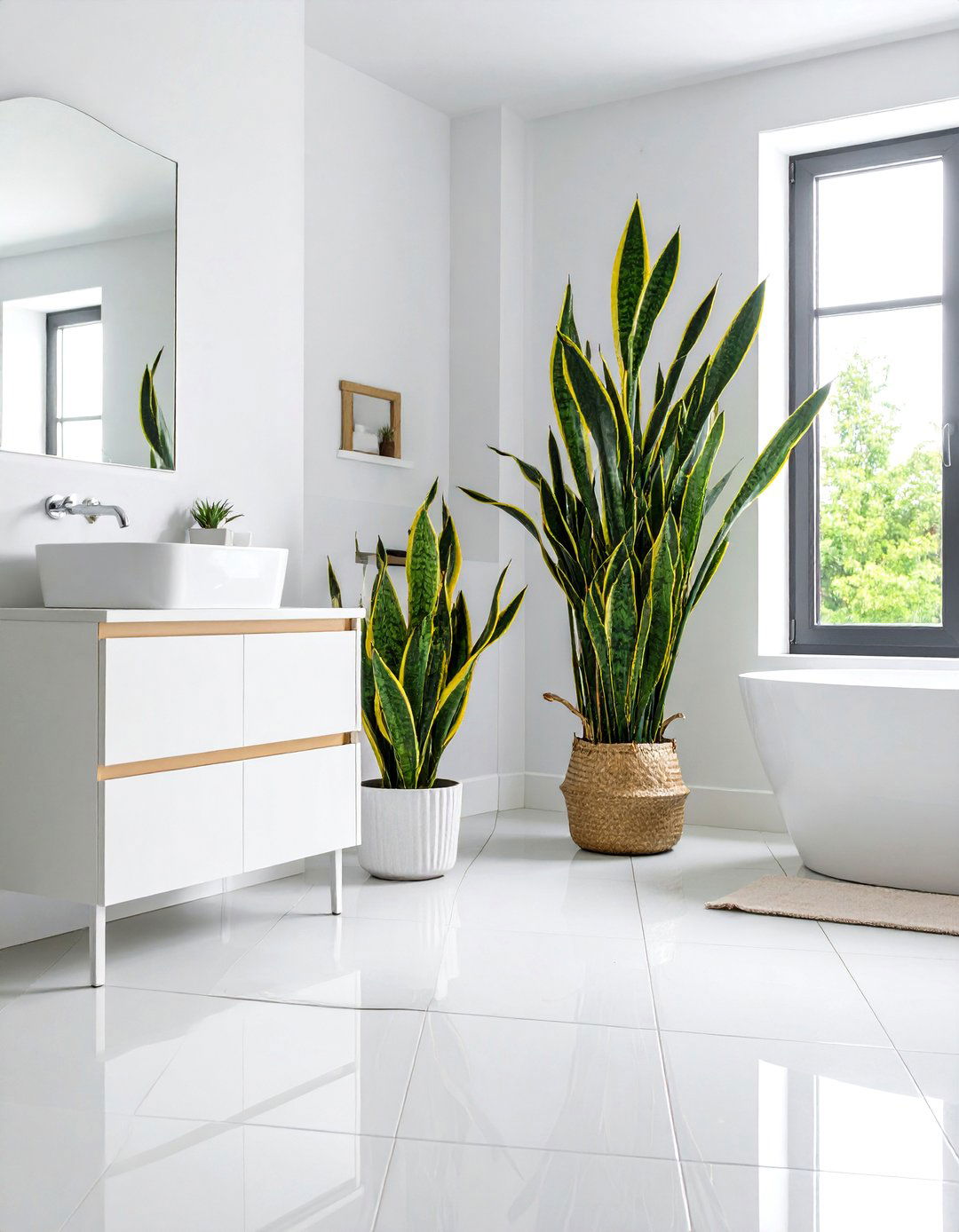
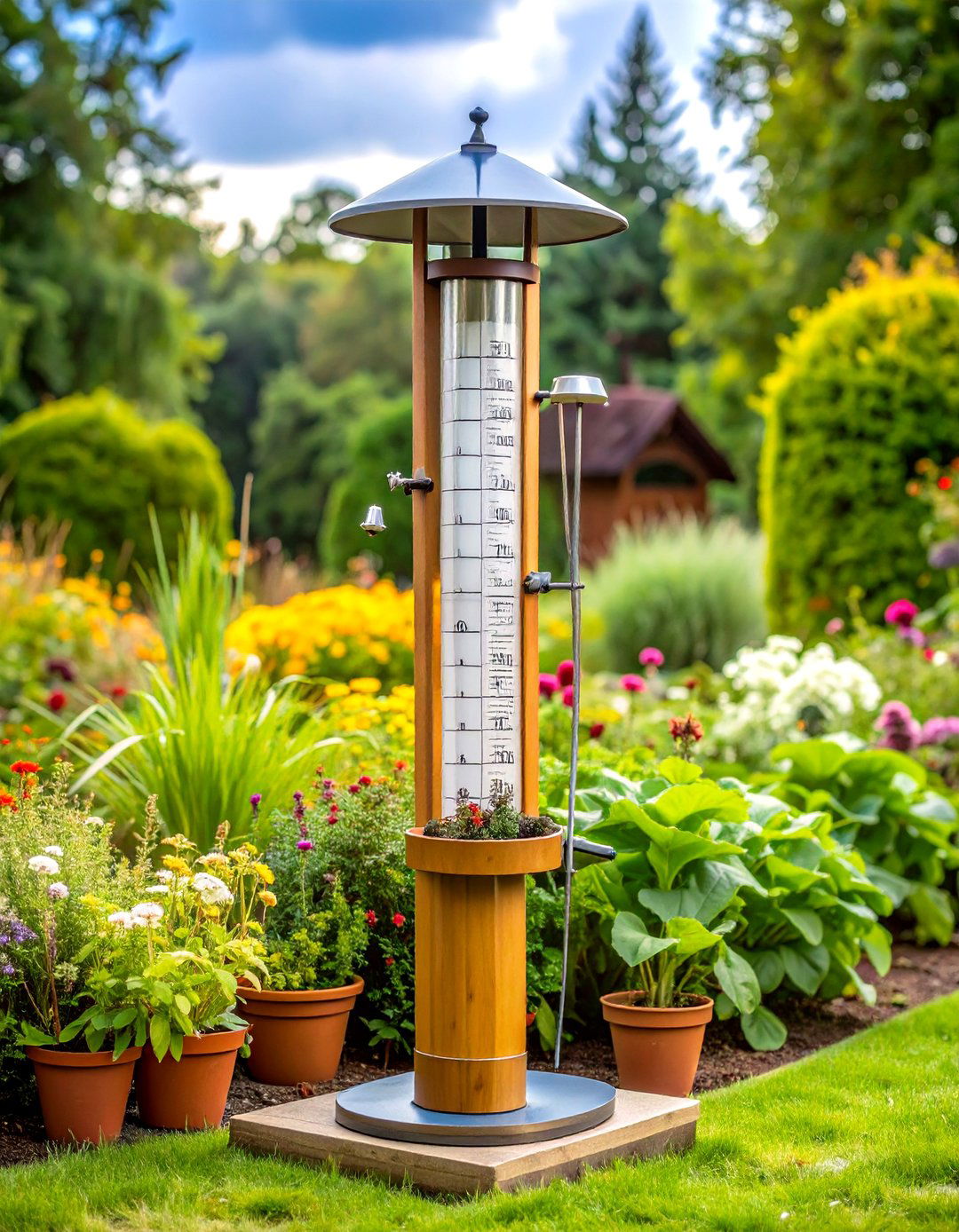



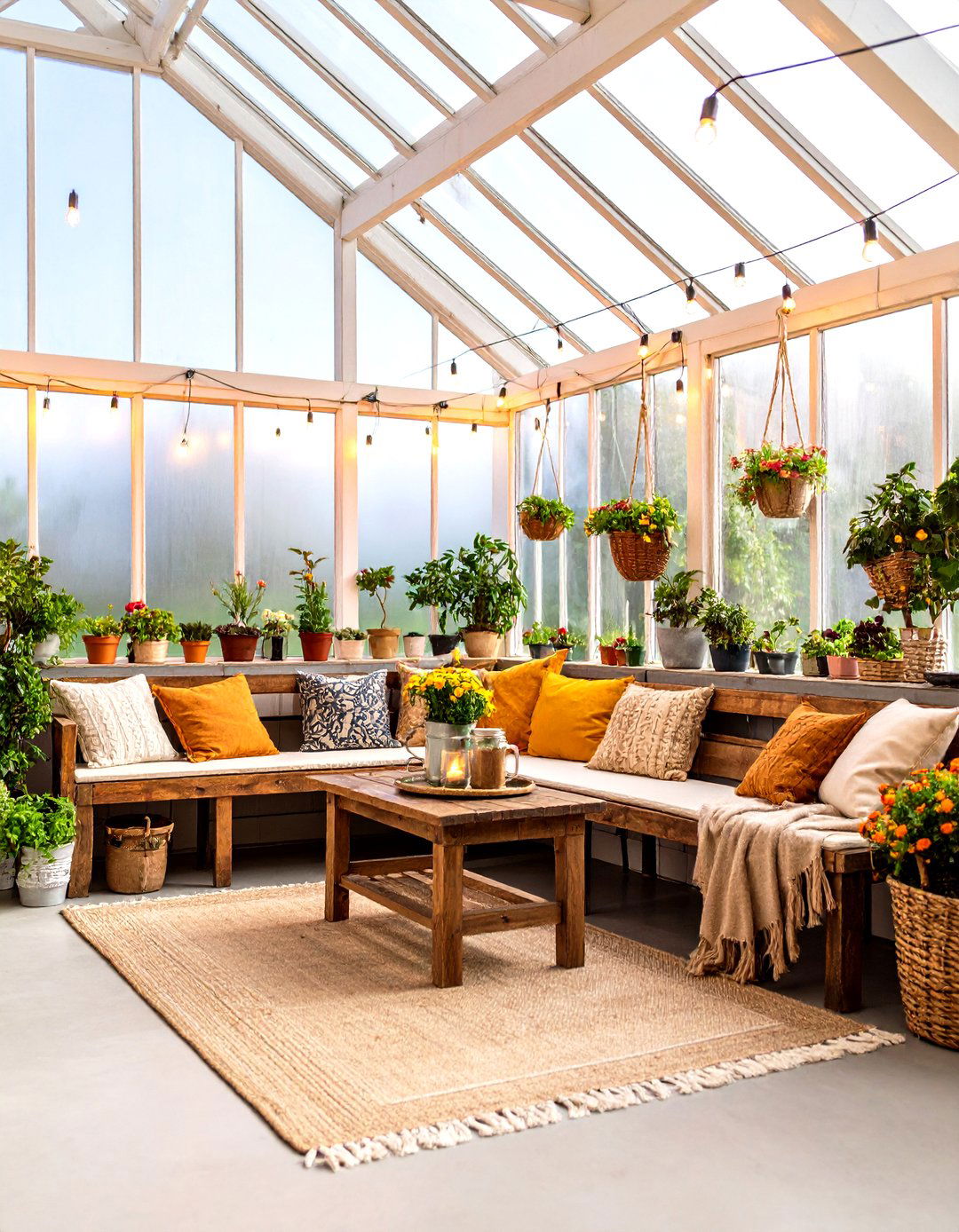

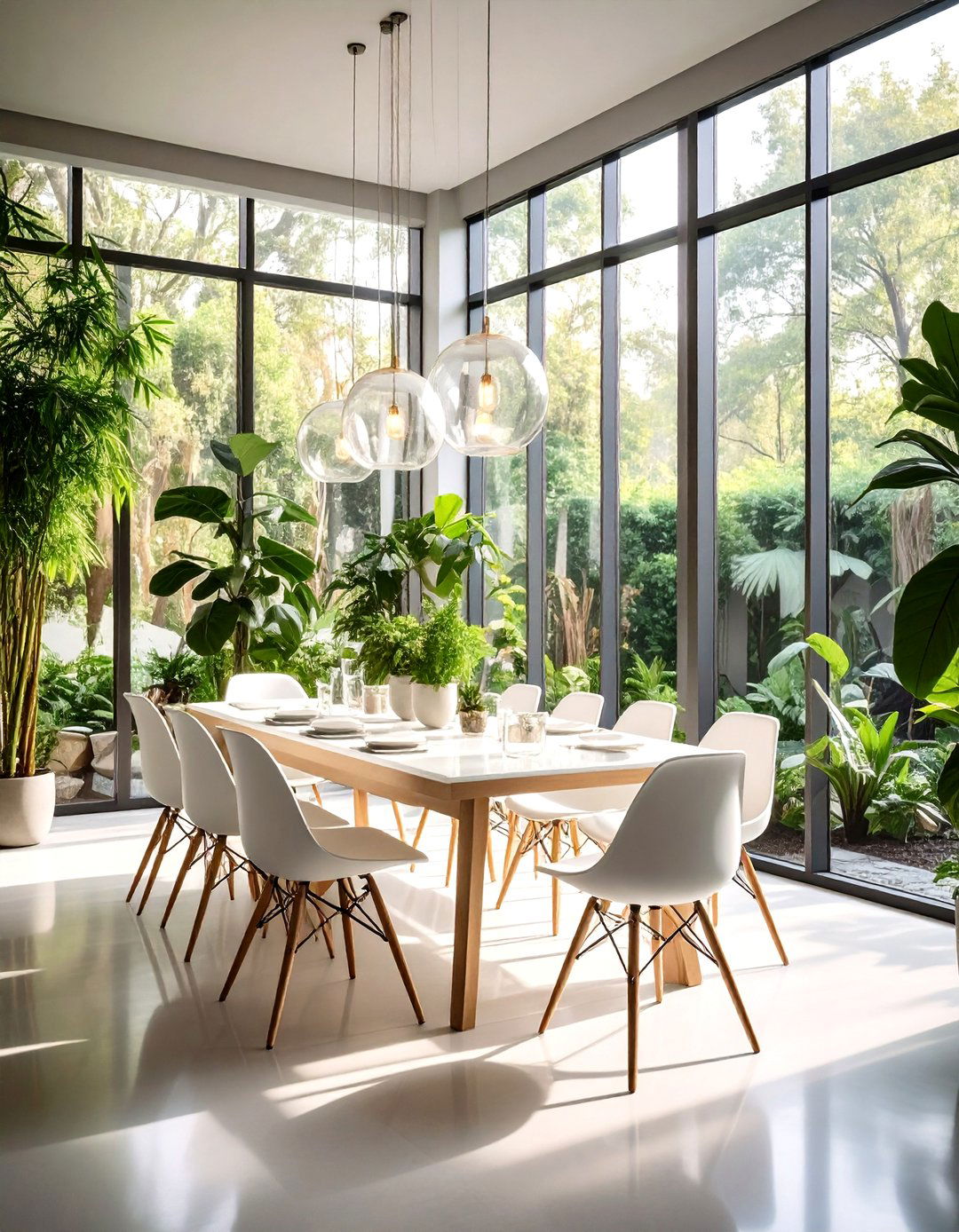
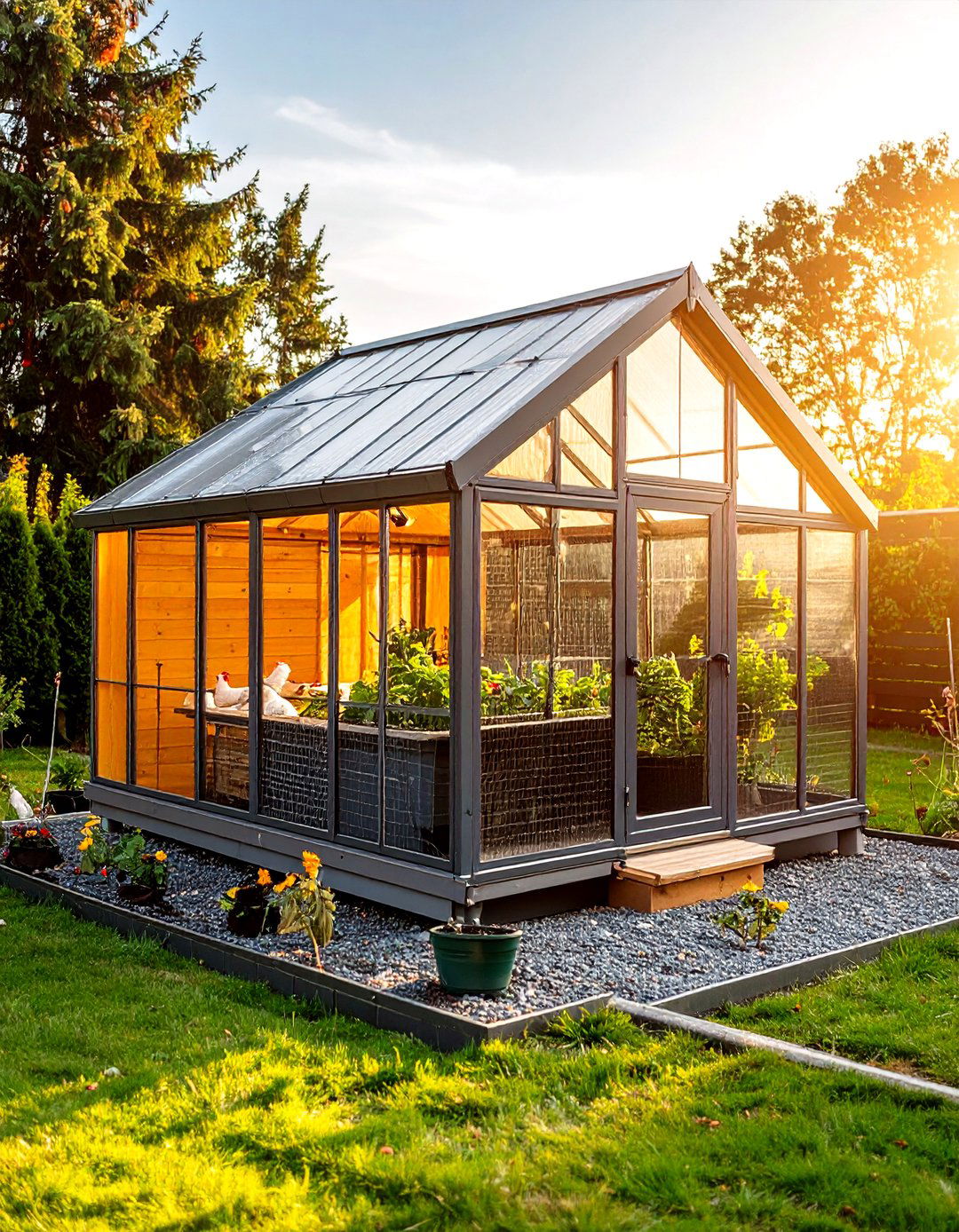
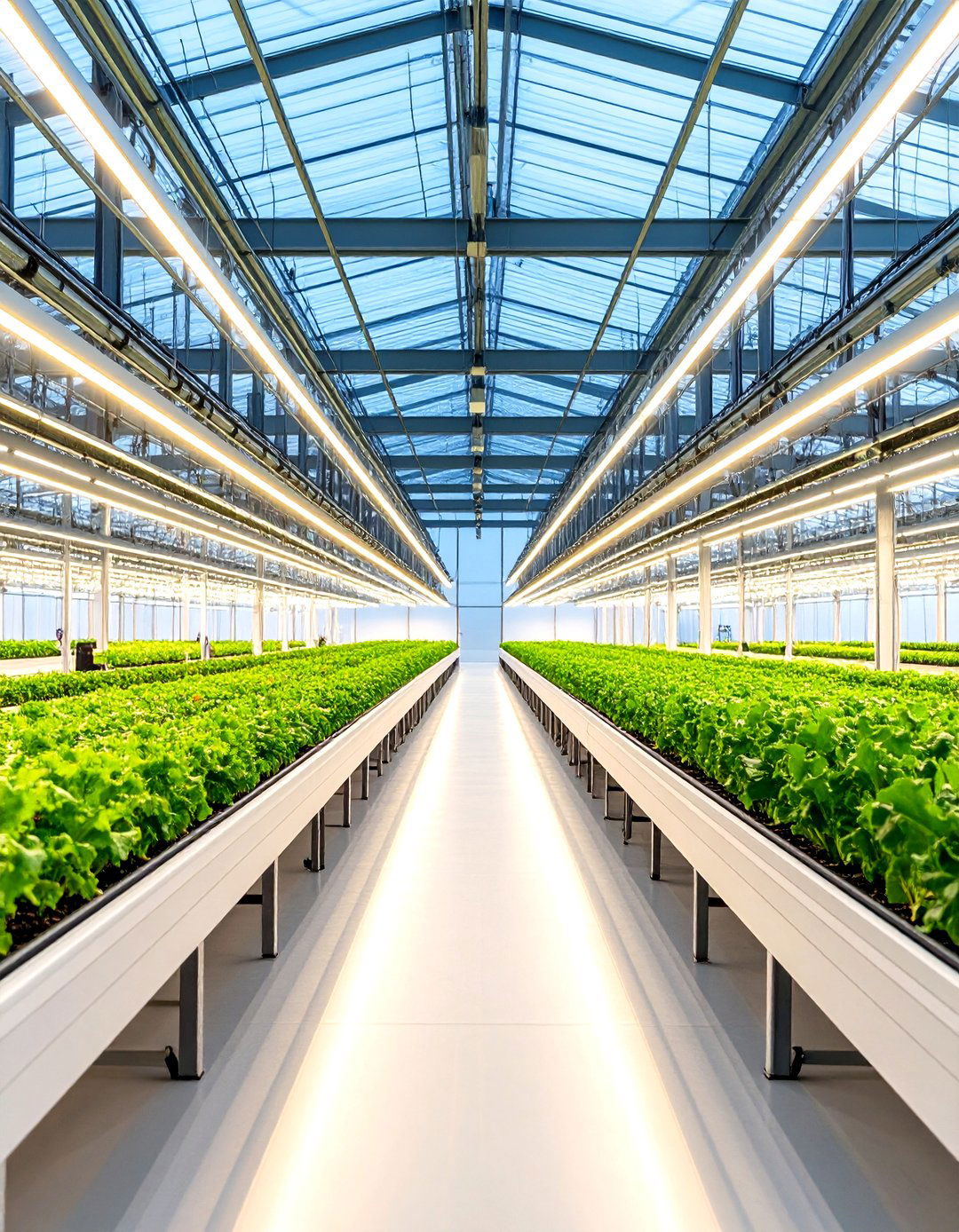
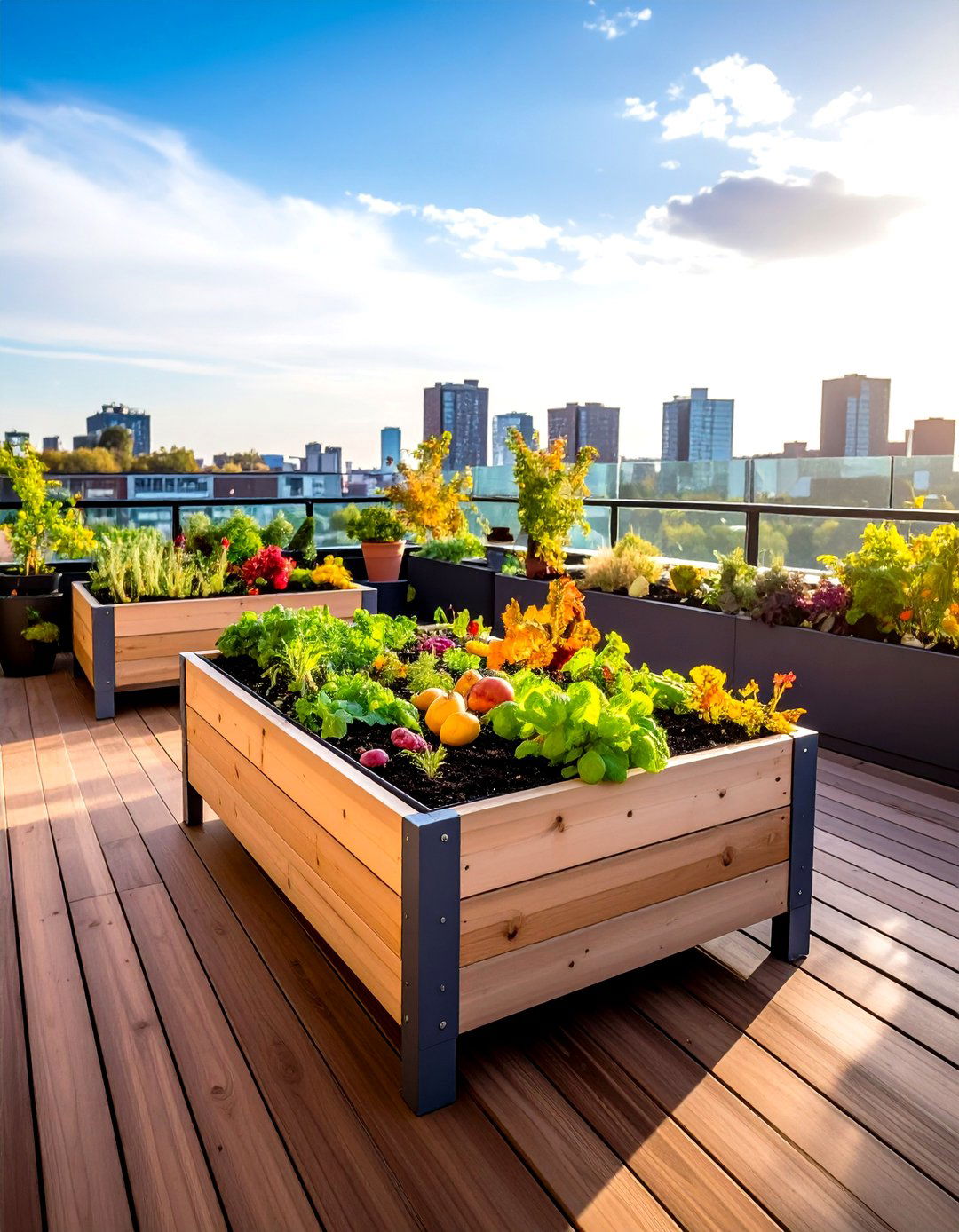

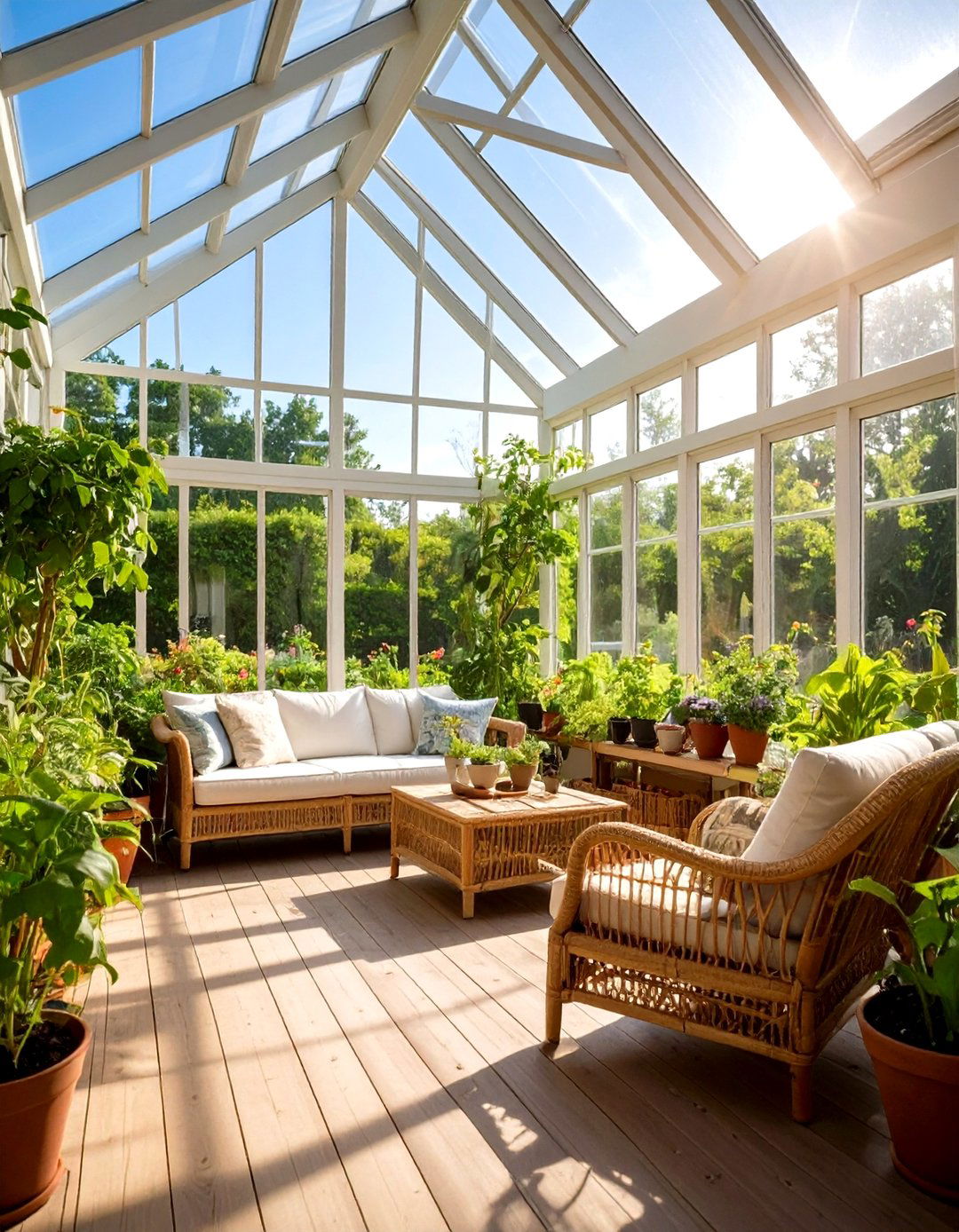
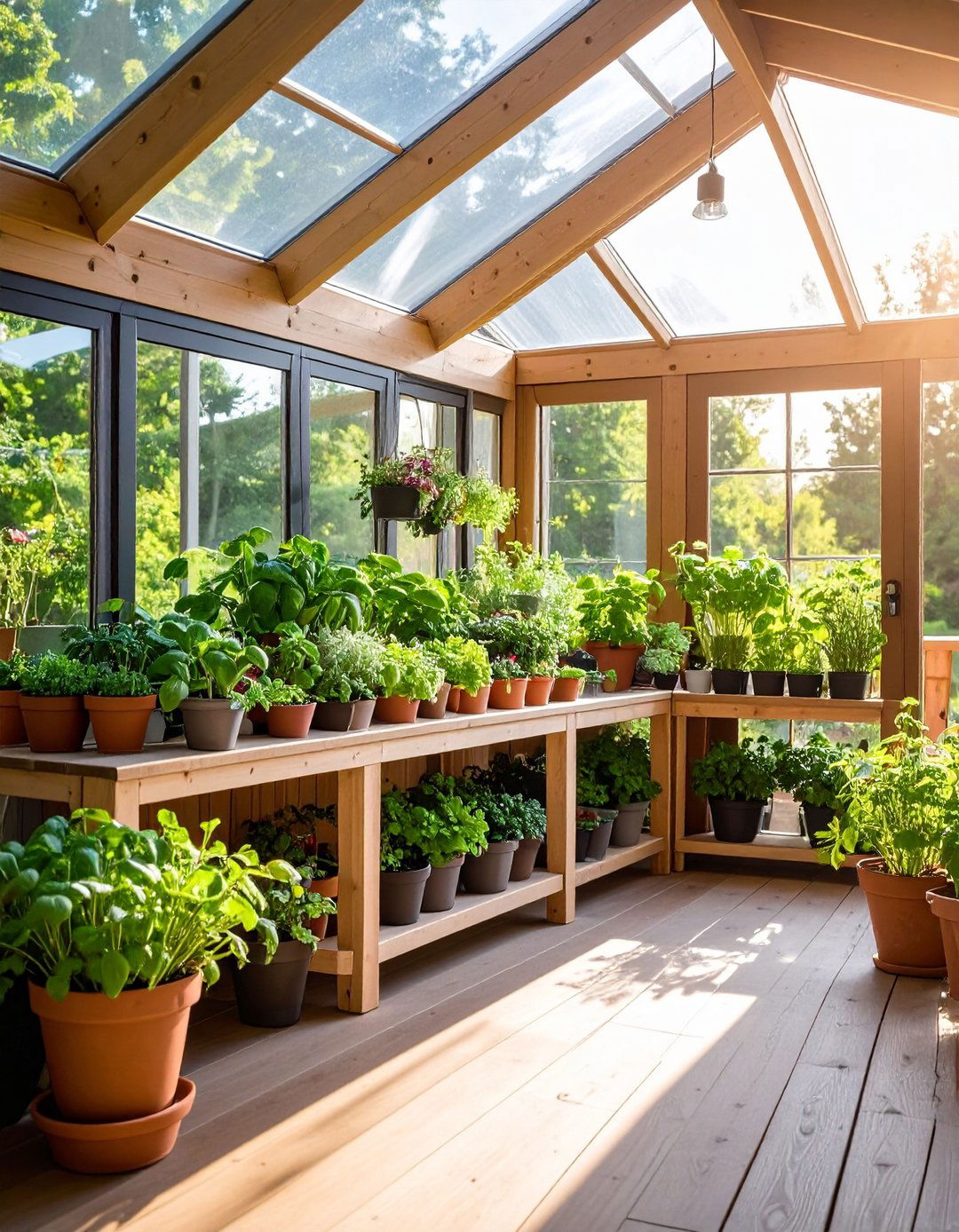
Leave a Reply